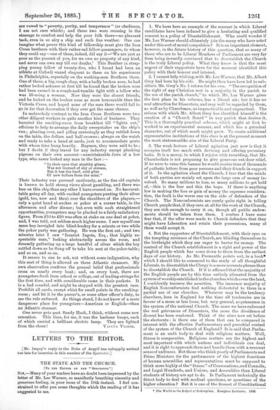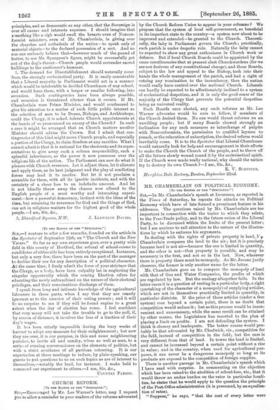LETTERS TO THE EDITOR.
[Mr. Impey's reply to the Duke of Argyll has unhappily arrived too late for insertion in this number of the Spectator.] THE STATE AND THE CHURCH.
fTe THE EDITOR OF THE " SPECTATOR."]
Sia„—Many of your readers have no doubt been impressed by the letter of Mr. Lee Warner, so manifestly breathing sincerity and generous feeling, in your issue of the 19th instant. I feel con- strained to offer you some thoughts which the reading of it has suggested to me. 1. We have here an example of the manner in which Liberal candidates have been induced to give a hesitating and qualified consent to a policy of Disestablishment. Who could wonder if Mr. Lee Warner should ultimately join the many who have acted under this sort of moral compulsion ? It is an important element, however, in the future history of this question, that so many of those who are to be Liberal Members of Parliament are very far from being inwardly convinced that to disestablish the Church is the truly Liberal policy. What they know is that the most urgent of their supporters have for the moment identified this policy with their honour and interest.
2. I cannot help wishing, with Mr. Lee Warner, that Mr. Albert Grey had been by his side. He might then have been led to sub- stitute Mr. Grey's No.1 reform for his own. "The recognition of the right of any Christian sect in a majority in the parish to the use of the parish church," to which Mr. Lee Warner gives the first place in his reforms, has a liberal air ; but it has no • real attraction for Dissenters, and may well be regarded by them, as well as by Churchmen, as impracticable and unpractical. The reform with which Mr. Albert Grey has identified himself is the creation of a "Church Board" in any parish that desires it. This is a thoroughly practical scheme, which might at first be worked in an experimental manner, and which has a germinal character, out of which much might grow. To create additional representative institutions of this class is at the present moment the most statesmanlike aim of the Liberal Party.
3. The weak feature of Liberal agitation just now is that it occupies itself too much with devising and offering pecuniary baits. It is a mercy, in which I rejoice with trembling, that Mr.
Chamberlain is not proposing to give generous out-door relief. If he were to raise this banner he would receive tens of thousands of pathetic letters from poor persons and their friends in support of it. In the agitation about the Church, I fear that the minds of both parties are mainly set upon the large sum of money in- volved. So many millions to lose, so many millions to get hold of,—this is the fear and this the hope. If there is anything low in making the loss or gain of money the supreme considera- tion, the fault is the worse one on the side of defenders of the Church. The Nonconformists are surely quite right in telling Church people that, if they care at all for the work of the Church, they are rich enough to carry it on, though all public endow- ments should be taken from them. I confess I have some fear that, if the offer were made to Church defenders that they might have Liberation and retain their possessions, many of them would accept it.
4. But the supporters of Disestablishment, with their eyes on the tempting revenues of the Church, are blinding themselves to the birthright which they are eager to barter for money. The control of the Church establishment is a right and power of the English people which has come down to them from the earliest days of our history. As Mr. Fremantle points out, in a book* which I should like to commend to the study of all thoughtful Liberals, to disestablish the Clergy is a more accurate phrase than to disestablish the Church. If it is affirmed that the majority of the English people are by this time entirely alienated from the system of worship established in the ch arches which cover the land, I confidently traverse the assertion. The immense majority of English Nonconformists find nothing distasteful to them in a partial use of our churches. Whatever may be the tendency elsewhere, here in England for the time all tendencies are in favour of a more or less loose, but very general, acquiescence in the system of the national Church. The more we have redressed the real grievances of Dissenters, the more the dissidence of dissent has been weakened. Think of the aims now set before the electorate : is there one of them that can be compared in interest with the effective Parliamentary and parochial control of the system of the Church of England P It is said that Parlia- ment is an unfit body to deal with religious matters. Well, fitness is comparative. Religious matters are the highest and most important with which nations and individuals can deal, and it is right to approach them and handle them with a reverent sense of unfitness. But those who think poorly of Parliaments and Prime Ministers for the performance of the highest functions of human assemblies and representatives must be supposed to think more highly of the" fitness" of Con vocations, and Councils, and Legal Hundreds, and Unions, and Assemblies than Liberal students of history are apt to do. Is Parliament technically the fittest body to deal with medical questions, or questions of the higher education ? But it is one of the firmest of Constitutional
• The World as the Subject of Redoniption. Bampton Lectures. 1883.
principles, and as democratic as any other, that the Sovereign is over all causes and interests supreme. I should imagine that s)mething like a sigh would swell the breasts even of Noncon- formist ministers, even of Mr. Chamberlain, in giving over the churches and cathedrals of the nation—to speak only of material objects—to the declared possession of a sect. And no one can seriously believe that—however much of the pound of batter, to use Mr. Spurgeon's figure, might be successfully got out of the dog's throat—Church people would surrender sacred buildings to the auctioneer's hammer.
5. The demand for Disestablishment should naturally come from the strongly ecclesiastical party. It is easily conceivable that a Liberal majority in Parliament would act in a manner which would be intolerable to decided Churchmen of any school, and would force them, with a larger or smaller following, into secession. Such contingencies have been always possible, and secession is threatened oftener than it occurs. If Mr. Chamberlain were Prime Minister, and would condescend to give his attention to a matter of such little public interest as the selection of men to be Deans, Bishops, and Archbishops, could the Clergy, it is asked, tolerate Church appointments at the hands of so pronounced an enemy of the Church ? In such a case it might be arranged that on Church matters another Minister should advise the Crown. But I admit that con- tingencies of this kind might move Church people, and especially a portion of the Clergy, to claim freedom at any sacrifice. What I cannot admit is that it is rational for the electorate and its repre- sentatives to give away such a solemn responsibility, such a splendid inheritance, as the power it now possesses over the religions life of the nation. The Parliament can now do what it pleases with Church revenues. Let it adjust them, let it alienate and apply them, as its best judgment and the play of conflicting forces may lead it to resolve. But let it not proclaim a scramble for them, with all its ignoble incidents, and with the certainty of a sheer loss to an indefinite amount. And let it not blindly throw away the chance now offered to the English people of a most worthy and interesting experi- ment—how a powerful democracy, instinct with the ideas of the time, but retaining its reverence for God and the things of God, can act in religions matters for the highest good of the whole people.—I am, Sir, &c.,



































 Previous page
Previous page